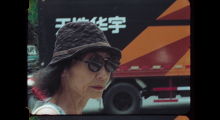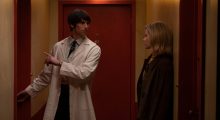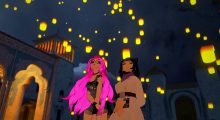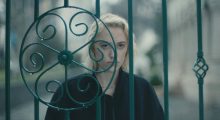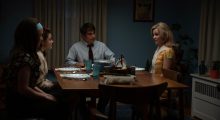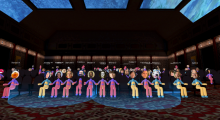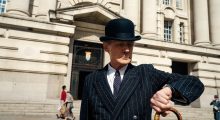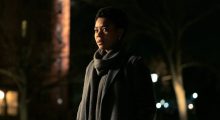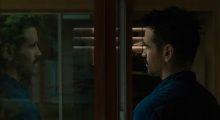6582 Results for “production”
-
“There’s Nothing Like Being in a Room Together and Bringing a Project to Life” | Ben Klein & Violet Columbus, The Exiles

The last two years have prompted much contemplation and reconsideration of the reasons why we make our films as well as the ways in which we make them. What aspect of your filmmaking—whether in your creative process, the way you finance your films, your production methodology or the way you relate to your audience—did you have to reinvent in order to make and complete the film you are bringing to the festival this year? We conceptualized this project in 2016 and started shooting in 2017. We shot on and off in various sprints until March of 2020. When the pandemic […]
by Filmmaker Staff on Jan 21, 2022 -
“It Was Important to Me That VR Felt Like a Euphoric and Cozy Place to Be”: DP Joe Hunting on We Met in Virtual Reality

We Met in Virtual Reality is a documentary shot, as the name suggests, within virtual reality. Director Joe Hunting trains his camera on a range of activities, including pool games, dances and educational classes to tell the stories of a number of couples who met in VR during the COVID-19 lockdown. Hunting, who directed, edited, and shot the film, spoke about his challenges and goals as cinematographer. Filmmaker: How and why did you wind up being the cinematographer of your film? What were the factors and attributes that led to your being hired for this job? Hunting: I was a self […]
by Filmmaker Staff on Jan 21, 2022 -
“Restrictions Sometimes Bring to Life Really Great Shots”: DP Greta Zozula on Call Jane

In Phyllis Nagy’s directorial debut Call Jane, Joy’s pregnancy leads to a life-threatening condition. When the medical establishment refuses to help, Joy turns to a clandestine organization called the “Janes” that is based on the real-life Jane Collective. The period piece is heavy on sequence shots, which both posed challenges and enabled the creativity of DP Greta Zozula, who discusses the film below. Filmmaker: How and why did you wind up being the cinematographer of your film? Zozula: I was introduced to Phyllis in the early part of last year. The subject matter was important and I was drawn to the […]
by Filmmaker Staff on Jan 21, 2022 -
“The Experimental Works I Was Already Creating Had Huge Potential to Invent a New Form of Immersive Global Filmmaking” | Joe Hunting, We Met in Virtual Reality

The last two years have prompted much contemplation and reconsideration of the reasons why we make our films as well as the ways in which we make them. What aspect of your filmmaking—whether in your creative process, the way you finance your films, your production methodology or the way you relate to your audience—did you have to reinvent in order to make and complete the film you are bringing to the festival this year? I began my filmmaking journey inside social VR during the fall of 2018, not foreseeing how valuable that endeavor would be. When the pandemic hit, it […]
by Filmmaker Staff on Jan 21, 2022 -
“We Find the Authenticity of Real Locations to Be Such a Huge Factor in Making a Believable and Captivating Movie”: DP Benjamin Kirk on Watcher

Shot on both vacant streets and luxury apartments in Bucharest, Watcher examines a woman uncertain whether to trust her instincts as she begins to suspect that someone—possibly a neighbor—is stalking her. As DP Benjamin Kirk explains, the camera embodies the state of mind of Julia, heightening the audience’s sense of peril, and films by David Fincher and Roman Polanski were touchstones for both Kirk and director Chloe Okuno. Filmmaker: How and why did you wind up being the cinematographer of your film? What were the factors and attributes that led to your being hired for this job? Kirk: Director Chloe Okuno and […]
by Filmmaker Staff on Jan 21, 2022 -
“Consideration of Our Own Mortality Provides Our Work With Urgency and Focus” | Phyllis Nagy, Call Jane

The last two years have prompted much contemplation and reconsideration of the reasons why we make our films as well as the ways in which we make them. What aspect of your filmmaking—whether in your creative process, the way you finance your films, your production methodology or the way you relate to your audience—did you have to reinvent in order to make and complete the film you are bringing to the festival this year? The pandemic served as a potent reminder that a consideration of our own mortality provides our work with urgency and focus—and with a decidedly necessary dark […]
by Filmmaker Staff on Jan 21, 2022 -
Sundance 2022 Critic’s Notebook: When You Finish Saving the World

I eased into the opening hours of my second virtual Sundance Film Festival better prepared than at this time last year. The festival, of necessity, pivoted back to online-only mode with so little heads-up time that seasonal staffers evidently learned they were out of gigs at the same time everyone else on Twitter heard about the change of plans—financially devastating for the suddenly unemployed and uncompensated, very regrettable for filmmakers, logistically fairly easy to adjust to for everyone else after a few years’ virtual fest training. This time last year I had a projector, but also roommates and hence the […]
by Vadim Rizov on Jan 21, 2022 -
“This Was the First Film I’ve Ever Made Where Every Day of Shooting Started With Dread” | Oliver Hermanus, Living

The last two years have prompted much contemplation and reconsideration of the reasons why we make our films as well as the ways in which we make them. What aspect of your filmmaking—whether in your creative process, the way you finance your films, your production methodology or the way you relate to your audience—did you have to reinvent in order to make and complete the film you are bringing to the festival this year? Having shot a film as vaccinations rolled out in the United Kingdom, and knowing that our project could be doomed if we had an outbreak of […]
by Filmmaker Staff on Jan 21, 2022 -
“Even if You Are Cutting a More Commercial Film, the Inspiration You Can Find From Obscure Films Is Endless”: Editors Jennifer Lee and Maya Maffioli on Master

Master, the debut feature by Mariama Diallo, takes place at the fictional Ancaster College, situated on land once occupied by gallows poles during the Salem witch trials. Blending horror and thriller elements with a critique of racism and privilege, the film follows numerous characters as the college’s façade of gentility begins to unravel. Mixing genres and following a large group of characters means the film could have gone in numerous directions, and editors Jennifer Lee and Maya Maffioli discuss the various incarnations the film assumed throughout the editing process. Filmmaker: How and why did you wind up being the editor […]
by Filmmaker Staff on Jan 21, 2022 -
“You Have to Become Vulnerable With Your Director Before You Can Go On Set”: DP Benjamin Loeb on After Yang

Like Columbus before it, Kogonada’s After Yang tackles its heady subject matter—including, in this case, a climate catastrophe and existential questions about the nature of humanity and memory that arise from its sci-fi setting—only obliquely, through composition and framing. Cinematographer Benjamin Loeb explained the significance of emptiness and space to cinema and the love he and Kogonada share for Ozu. Filmmaker: How and why did you wind up being the cinematographer of your film? What were the factors and attributes that led to your being hired for this job? Loeb: Honestly, I believe I was the unicorn of the interviews and came in very […]
by Filmmaker Staff on Jan 21, 2022
